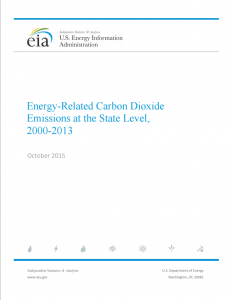Full Title: Energy-Related Carbon Dioxide Emissions at the State Level, 2000-2013
Author(s): U.S. Energy Information Administration (EIA)
Publisher(s): U.S. Energy Information Administration (EIA)
Publication Date: October 1, 2015
Full Text: Download Resource
Description (excerpt):
Energy-related carbon dioxide (CO2) emissions vary significantly across states, whether considered on an absolute (Figure 1) or per capita basis. Total state CO2 emissions include those from direct fuel use across all sectors, including residential, commercial, industrial, and transportation, as well as primary fuels consumed for electric generation. The overall size of a state, as well as the available fuels, types of businesses, climate, and population density, play a role in determining the level of both total and per capita emissions. Additionally, each state’s energy system reflects circumstances specific to that state. For example, some states have abundant hydroelectric supplies, while others contain abundant coal resources. This paper presents a basic analysis of the factors that contribute to a state’s CO2 profile. This analysis neither attempts to assess the effect of state policies on absolute emissions levels or on changes over time, nor does it intend to imply that certain policies would be appropriate for a particular state.
The term energy-related CO2 emissions, as used in this paper, includes emissions released at the location where fossil fuels are consumed. Therefore, to the extent that fuels are used in one state to generate electricity that is consumed in another state, emissions are attributed to the former rather than the latter. Analysis attributing emissions to the consumption of electricity, rather than the production of electricity, would yield different results. For feedstock application, carbon stored in products such as plastics are subtracted from reported emissions for the states where they are produced.
